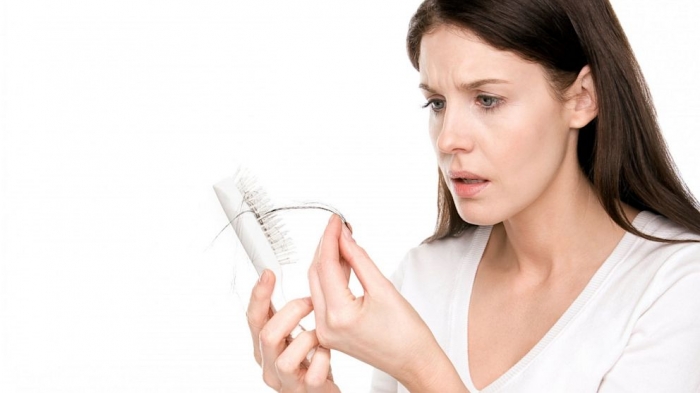1. Hormones
As young girls turn into growing teenagers, they go through many bodily changes, including changes in their hormones. These hormones then fluctuate their emotions, eating habits, and their hair growth.
Because the root cause of hair loss lies in one special hormone, present in both men and women, you can understand how hormonal changes and imbalances create such a problem. The hormone responsible for hair loss in anyone is dihydrotestosterone, or DHT. This hormone usually manifests in men; however, women and girls have low levels of testosterone as well.
Unfortunately, with the help of an enzyme that rests in the hair’s oil glands, testosterone changes to DHT. Then, DHT literally shrinks the hair follicles, causing hair to fall out. Teenage girls may experience this hair loss until the hormones balance out in their bodies.
2. Medicine
Certain medications can cause hair loss in both teens and adults, especially ones which alter the hormones. In particular, some teenage girls may take birth control pills to relieve PCOS or control acne.
However, the pill is also known for thinning out the hair. In fact, some doctors actually prescribe it to help teens who have excessive hair growth on their bodies.
Other medications can cause hair loss as well, including anticoagulants, beta blockers, and even high doses of vitamin A.
3. Poor nutrition
Most people don’t think about the role of nutrition in healthy, supple hair and skin, but it does play a vital role. American teens often eat a diet high in starch and fats rather than a nourishing variety of fruits and vegetables.
As a result, these teens can have deficiencies in important vitamins and nutrients. Their bodies then try to conserve what few healthful nutrients it has for its life-sustaining functions, diminishing the amount of nutrients to the hair. In addition, some teens may have poor nutrition due to eating disorders, and parents should watch carefully for this cause of hair loss.
4. Over-Styling
In an effort to keep up with current trends and styles, teenage girls often use heat products and tight hairstyles. If they use straighteners, blow dryers, and curling rods daily, they’ll eventually be dealing with dry, brittle hair.
In addition, tight hairstyles like high ponytails and braids tug at the hair. If used often enough, they can pull out clumps, leading to embarrassing bald patches and shortened strands.
5. Deeper Medical Condition
Sometimes, excessive hair loss can signal a deeper medical condition. For example, people can suffer hair loss if they have a scalp infection, unregulated diabetes, an overactive or underactive thyroid, skin disorders, or trichotillomania (compulsive hair-pulling).
In most cases, these underlying medical conditions will have accompanying symptoms, such as scaly or inflamed skin, losing hair in big patches, and fatigue. Parents should take note of any other changes accompanying the hair loss in teenage girls and talk over any concerns with a doctor.
Treating and Preventing Hair Loss in Teenage Girls
The best way to treat hair loss is to address the root of the problem. Consider these steps in promoting healthy hair and nutrition for the body:
Eat a well-balanced diet at optimal caloric intake.
Eat more foods containing omega-3s.
Wash and brush hair gently. Apply nourishing oils, such as argan or coconut oil.
Limit heat styling and tight up-styles to certain days.
Test for vitamin deficiencies, especially iron. Studies show that female hair loss often directly links to iron deficiencies.
Test for abnormal hormonal imbalances and work with a doctor to correct it. Since hair loss is caused by hormonal functions, many cases of hair loss are related to hormonal imbalances.
Reduce stress in the teen’s life.
Stimulate the scalp with a massage.
In most cases of hair loss, the above steps should take care of the problem. However, if the hair loss continues after several months, parents and teens should work closely with their doctors to discover the root cause. Also, if other abnormal symptoms are occurring with the hair loss, teens should see a doctor.
More about: #HairLoss
















































